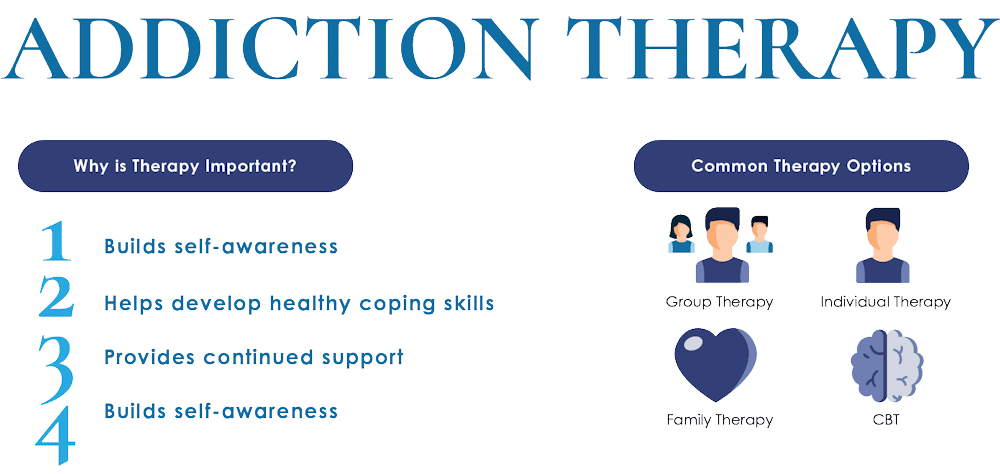Addiction is an overwhelming and chronic disease. Substance use disorders often lead to physical and mental changes that rob people of their power of choice. Even if they want to quit, their physical and mental dependency on a substance can crush that desire to moderate or stop usage.
Like any chronic disease, substance abuse often requires professional addiction treatment. That’s where therapy for addiction comes in. Our substance abuse treatment programs involve various behavioral therapies. These therapeutic approaches can help our clients heal from addiction and maintain sobriety. Through our behavioral therapies, individuals can overcome alcohol and drug abuse for good.
What is Therapy for Addiction?

Therapy is the provision of guidance in dealing with social, personal, or psychological issues. Addiction counseling enables a professional therapist to guide and assist recovering individuals as they recover.
When it comes to treating addiction, therapy plays a monumental role. Alcohol and drug addiction treatment programs are successful due to their various components, therapy being one of them. In addiction treatment, counseling allows treatment professionals to discover the underlying issues in a person’s life. It also provides recovering individuals with the tools they need for overcoming addiction.
Why is Therapy for Addiction Important?

Therapy for addiction is incredibly important for many reasons. Addiction counseling:
- Helps people to discover the underlying causes of their addictions.
- Provides people with a safe space to discuss their challenges.
- Reveals addictive behaviors and equips people with the tools to avoid them.
- Helps family members to learn more about their struggling loved ones.
- Can help increase self-confidence and self-awareness.
- Provides continued support for those in recovery.
- Shows people how to cope with triggers in healthy ways.
- Replaces negative behaviors with healthy behaviors.
- Can boost low self-esteem.
Behavioral therapies have proven successful when it comes to alcohol and drug abuse treatment. So, those who are suffering from substance use disorders can rest assured that therapy can help them!
What Are Common Addiction Therapy Options?

Everyone who suffers from substance abuse has a unique experience with this disease. They have unique stories and pasts. They have specific needs throughout addiction recovery. This is why it is necessary to have various therapy options available. Individuals in alcohol and drug addiction treatment can benefit from these varying therapy approaches.
Here at our Massachusetts alcohol and drug abuse treatment center, we offer quite a few types of therapy. Some of them include individual therapy, group therapy, and family counseling.
Individual Therapy
Individual counseling is a person-centered therapy approach. Individual therapy sessions involve only the recovering individual and a therapist. While in an individual therapy session, the therapist will examine the patient’s personal life. The patient and counselor may discuss matters such as:
- Past trauma
- Family issues
- Financial worries
- Difficulties at work
- Alcohol and drug cravings
- Underlying causes of addiction
- Co-occurring mental health issues
- Fears and uncertainties regarding addiction and recovery
Individual counseling can be quite beneficial for those in alcohol and drug addiction treatment. It allows people to learn more about themselves and their struggles with substance abuse. Most importantly, however, it helps people develop the tools and skills they need to overcome alcohol addiction and drug abuse.
Group Therapy
Group therapy for addiction is counseling that takes place in a group setting. Sessions typically involve multiple recovering individuals and one or more therapists. Different types of group therapy include:
- Support groups
- Skill development groups
- Psychoeducational groups
- Interpersonal process groups
- Cognitive behavioral therapy groups
In many cases of substance abuse, individuals experience broken relationships. They grow apart from the people they care about and love. Fortunately, however, group therapy can help with this. This type of therapy can help improve relationships between recovering individuals and their families or friends.
While in group therapy for substance abuse, people can learn how to interact with others. Recovering individuals can regain interpersonal skills. They can develop healthy habits in regard to maintaining relationships with others.
Group therapy helps people to connect with others who are going through substance abuse treatment. This can assist people in learning more about the effects of alcohol and drug addiction. As a result, recovering individuals can learn from their own experiences and the experiences of others.
Family Therapy

As a part of addiction treatment, family therapy can help family members to better understand what their loved one is experiencing. It can educate families on addiction and its effects. Family therapy also helps family units to understand the details of addiction treatment and how it can help.
Suffering from a substance use disorder can negatively affect the way individuals treat people. A person might be dishonest to his or her family members. The individual may develop different behaviors and thought processes.
Behavioral therapies can help people to work through these issues. But, family therapy works to also bring healing to those who were hurt by the effects of alcohol and drug abuse.
Cognitive Behavioral Therapy
Cognitive behavioral therapy (CBT) addresses negative thought patterns in the life of a person suffering from addiction. These negative thoughts can contribute to addiction, causing those suffering from substance abuse to turn to drugs or alcohol to cope. When a person cannot escape from their harmful thoughts, CBT is used to address how these thought patterns are disrupting their ability to live a normal and healthy life.
Through CBT, the negative thought patterns leading to substance abuse that are identified are subsequently replaced with positive thinking. By getting a patient used to addressing concerns head-on, and with a positive mindset, they are then better equipped to handle everyday fears and worries without needing their substance of choice.
Dialectical Behavior Therapy
Dialectical behavior therapy (DBT) facilitates recovery in various ways for an individual suffering from a substance abuse disorder. This type of addiction therapy seeks to help patients identify trauma in their past with the goal of working out the negative feelings attached to that trauma. Additionally, in this type of addiction therapy, a therapist teaches the individual in recovery to handle their emotions in a healthy way without needing drugs or alcohol to numb their feelings.
This comprehensive addiction therapy also helps patients learn to both make and achieve positive goals. This is used to create a life they see as worth participating in. Rather than abandoning goals at the first sign of difficulty, patients are prompted to accept challenges and work to create positive change in their lives.
Other Types of Therapy for Addiction
Some other addiction therapy options that can help recovering individuals may include the following:
- Couples therapy
- Online therapy
- Contingency management
- Motivational interviewing
- Rational emotive behavior therapy (REBT)
- Eye movement desensitization and reprocessing (EMDR)
Behavioral therapies such as these can help people develop the mindset they need for everyday life after treatment. Life skills come in many different forms and behavioral therapy can help facilitate their development. Whether a person participates in contingency management, motivational interviewing, or couples therapy, the results can be quite rewarding.
Drug abuse can impact people in varying ways. This is why drug addiction treatment has to be multifaceted. It must be able to pinpoint and deal with specific issues. Behavioral therapies help make drug addiction treatment more effective in that way.
Addiction Treatment Programs at Chapters Recovery Center
Here at our Massachusetts addiction treatment center, we offer various programs. Our treatment options include therapy programs to help people overcome alcohol and drug addiction. So, individuals searching for comprehensive addiction treatment programs that will meet their needs can find them here! We also offer an outpatient addiction rehab program to help those who are working to overcome substance use disorders.
Learn More About Our Behavioral Therapies at Chapters Recovery Center

Maintaining sobriety is not always easy. It can be difficult to stay free from substance addiction, even after going through treatment. But therapy for addiction is instrumental in equipping people with the life skills they need to keep moving forward.
While suffering from drug and alcohol addiction, you may have felt alone. Your self-esteem may have plummeted. You might have had family issues that you couldn’t mend. But, you are no longer alone. You can leave alcohol and drug abuse behind. Despite your past, you can replace harmful behaviors with healthy habits. You can pursue a life of freedom and healing by simply choosing to receive treatment for your addiction.
If you’re searching for behavioral therapies in New England, reach out to Chapters Recovery Center. We are committed to your recovery and unique needs. We will work with you to create a treatment program that suits you best. To explore our treatment options and behavioral therapies, contact us. Recovery and sober living are only a phone call away. Get treatment today.[/vc_column_text][/vc_column][/vc_row]

